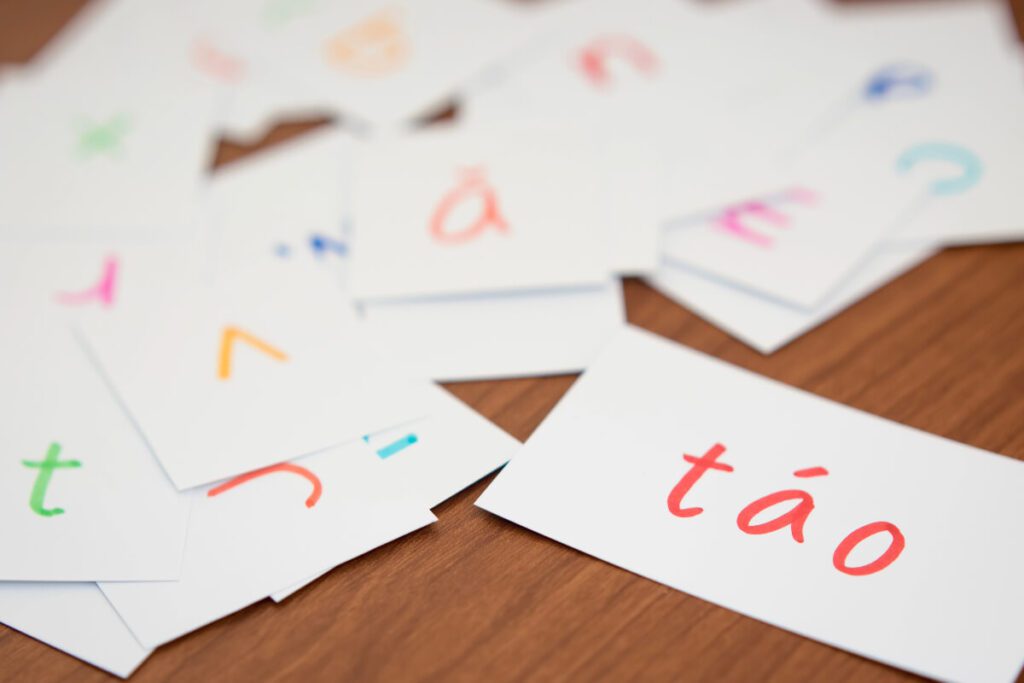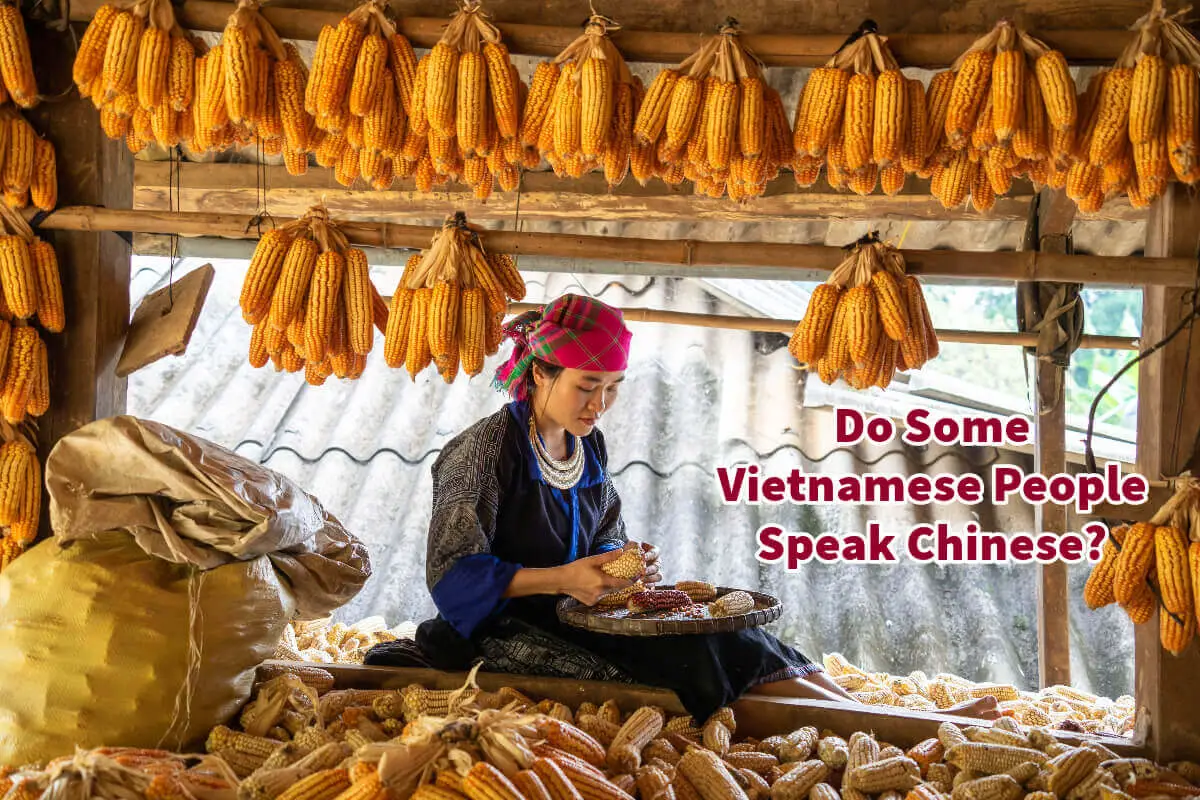I’ve had the privilege of residing in China and Vietnam, allowing me to delve into Chinese and Vietnamese languages. Contrary to what some might believe, these languages are distinct.
Most Vietnamese I encountered did not speak Chinese, except those who resided near the China-Vietnam border or had formally studied the language. Similarly, the Chinese I met did not understand Vietnamese. It’s crucial to understand that these are two separate languages with their intricacies. Read on as we explore more about the Vietnamese and Chinese languages.
Table of Contents
- Do Some Vietnamese People Speak Chinese? A Closer Look
- 15 Ways Vietnamese And Chinese Are Two Very Different Languages
- 10 Reasons Why Learning Another Language, Such as Chinese or Vietnamese, is Beneficial
- Frequently Asked Questions
- Related Questions
Do Some Vietnamese People Speak Chinese? A Closer Look
Vietnam and China, two neighboring countries, share a rich tapestry of history, culture, and trade. Given the proximity and historical ties, one might wonder: Do Vietnamese people speak Chinese? The simple answer is some do, but the majority do not. Let’s delve deeper.
The Border Residents May Speak Chinese
It is reasonable to assume that those living near international borders may pick up the neighboring country’s language due to trade, intermarriages, or daily interactions. The same holds for some Vietnamese living close to the China-Vietnam border.
Due to these interactions, they might have a basic understanding or even fluency in Chinese.

In my office, we had a maid who lived near the Chinese border and spoke fluent Mandarin Chinese. Even though she was not educated and had never attended university, her spoken Chinese was excellent.
I was able to communicate with her daily in Mandarin Chinese. She told me she picked up Mandarin Chinese while living and working near the Chinese-Vietnamese border.
Some Vietnamese May Study Chinese
In the era of globalization, many Vietnamese see the value in learning multiple languages. Some Vietnamese study Chinese for trade, business, or academic reasons, thus acquiring varying proficiency.
Since 2017, Vietnam has expanded its language education to include Chinese in many schools, ranging from primary level onwards. While not all schools offer Chinese, English, French, and Russian are now among the languages available for instruction. This inclusion has led to Chinese becoming the second most spoken language in Vietnam, following English.
It is interesting to point out that Chinese is spoken in some parts of Vietnam despite historical tensions exist between Vietnam and China, stemming from China’s 1,000-year rule over Vietnam. Furthermore, the 1979 border conflict between the two nations, which resulted in significant Vietnamese casualties, remains a sad memory for many.
15 Ways Vietnamese And Chinese Are Two Very Different Languages
At a cursory glance, someone unfamiliar with Asian languages might assume similarities between Vietnamese and Chinese. However, the two languages have evolved separately and have distinct features.

Here are 15 ways Vietnamese and Chinese differ:
Origins:
Vietnamese is an Austroasiatic language, while Chinese belongs to the Sino-Tibetan family. This means their roots and evolution have been largely separate.
Writing System:
Chinese uses a logographic writing system called Han characters or Hànzì. In contrast, the Vietnamese, after centuries of using a modified set of Chinese characters called Chữ Nôm, transitioned to the Latin-based script called Quốc Ngữ in the 20th century.
Tones:
Both languages are tonal, but they differ in the number and nature of tones. Standard Mandarin Chinese has four primary tones. Meanwhile, the northern dialect of Vietnamese (e.g., Hanoi) has six tones.
Phonology:
The sounds (phonemes) in Vietnamese and Chinese vary. For instance, certain sounds present in Chinese are absent in Vietnamese and vice versa.
Vocabulary:
Despite some loanwords from Chinese due to historical interactions, Vietnamese vocabulary fundamentally differs from Chinese.
Grammar:
Vietnamese grammar is more akin to other Austroasiatic languages and significantly differs from Chinese grammar. For example, Vietnamese uses particles to indicate tense, whereas Chinese often uses word order and additional words.
Plural Forms:
Vietnamese generally don’t change the noun form to indicate plurals, whereas Chinese might use quantifiers or repetition.
Numbers:
The way numbers are pronounced and sometimes even structured can be very different between the two.
Pronouns:
In Vietnamese, pronouns often indicate not just gender and number social status, and the relationship between the speaker and the listener. Chinese pronouns are more straightforward in comparison.
Adjectives:
In Vietnamese, adjectives can function as verbs, which is not the case in Chinese.

Measure Words:
While both languages use measure words (words used with nouns to indicate the count of something), the actual words and the contexts in which they are used can differ widely.
Verb Forms:
Vietnamese verbs do not conjugate. Chinese verbs also don’t conjugate in the way many Western languages do, but the usage and placement of verbs in sentences can differ considerably.
Loanwords:
Modern Vietnamese have borrowed words from the French, thanks to colonial history. Chinese, meanwhile, has its set of modern loanwords, often from English.
Idiomatic Expressions:
As with all languages, idioms often don’t translate directly. Vietnamese and Chinese idiomatic expressions are rooted in their respective cultures and histories.
Cultural Context:
Language is more than just words and grammar; it’s also about cultural context. The stories, traditions, and values embedded in Vietnamese differ from those in Chinese.
While some Vietnamese individuals can speak and understand Chinese, especially those near the border or those who’ve studied the language, it’s essential to recognize that most Vietnamese do not know Chinese.
Despite their historical interactions, the languages are vastly different in multiple ways. Knowledge of one does not equate to understanding the other.
Understanding these nuances becomes vital for effective communication and cultural respect as our world grows increasingly interconnected.
10 Reasons Why Learning Another Language, Such as Chinese or Vietnamese, is Beneficial
Over the years, as I delved into learning languages like Chinese and Vietnamese, I uncovered many benefits beyond just communication.
Here are ten compelling reasons, rooted in my personal experience, which underscore the value of learning another language:
- Deeper Cultural Understanding: Language is a window to a culture. As I studied Chinese and Vietnamese, I found myself gaining insights into the intricate tapestries of their histories, customs, and values, enriching my understanding of these civilizations.
- Effective Communication While Traveling: With my language skills, traveling in China or Vietnam isn’t just about sightseeing. I can converse with locals, ask for directions, order food, or simply engage in small talk. This makes the journey more interactive and genuine.
- Enhanced Travel Experience: Knowing the local language transforms travel from a mere visit to an immersive experience. It allowed me to dive deeper, uncovering hidden gems, local stories, and off-the-beaten-path destinations in these countries.
- Boosted Cognitive Abilities: Studies have shown that learning another language enhances cognitive skills, improves memory, and even delays the onset of age-related cognitive decline. I’ve personally felt sharper and more mentally agile since diving into language studies.
- Enhanced Career Opportunities: In an increasingly globalized world, bilingualism or multilingualism can be a significant asset. It opens doors to international job opportunities and collaborations.
- Building Relationships: Learning Chinese and Vietnamese has allowed me to form connections and friendships that wouldn’t have been possible otherwise. Language is a bridge that connects hearts and minds.
- Appreciation for Language Nuances: Every language has its idioms, proverbs, and expressions. Understanding these enriched my vocabulary and gave me insights into the unique ways different cultures perceive the world.
- Increased Adaptability: Navigating different linguistic landscapes has honed my adaptability. I find myself more open and receptive to unfamiliar situations, be it in travel or everyday life.
- Boosted Self-Esteem: Every word or sentence I learned and successfully used in conversation was a small victory. It boosted my confidence and motivated me to delve deeper.
- Personal Growth: Beyond the practical benefits, learning Chinese and Vietnamese has been a journey of personal growth. It taught me patience, perseverance, and the joy of connecting with another culture through its language.
The journey of learning a new language, be it Chinese, Vietnamese, or any other, is multifaceted and enriching. Each word and phrase I’ve learned isn’t just about communication; it’s a step towards understanding the world a little better and connecting with it more deeply.
At A Bus On A Dusty Road, we talk about everything about travel, life, and ex-pat living. We are all about “Living Life As A Global Citizen.” We explore social, cultural, and economic issues and travel.
We would love to have you be part of our community. Sign up for our newsletter to keep up-to-date by clicking here. If you have any questions, you can contact me, Anita, by clicking here.
Listen to our Podcast called Dusty Roads. You can find it on all major podcast platforms. Try out to listen to one of our podcasts by clicking here.
Subscribe to our A Bus On A Dusty Road YouTube Channel filled with great videos and information by clicking here.
Frequently Asked Questions
1. Do Vietnamese people generally speak Chinese?
No, the majority of Vietnamese people do not speak Chinese. Vietnamese and Chinese are distinct languages, and most Vietnamese individuals do not have proficiency in Chinese unless they live near the China-Vietnam border or have studied the language.
2. Are there any situations where Vietnamese people might speak Chinese?
Vietnamese people near the China-Vietnam border or those involved in cross-border activities may speak Chinese due to proximity and interactions with Chinese communities.
3. Do Chinese people in Vietnam speak Vietnamese?
Similarly, Chinese people in Vietnam typically do not speak Vietnamese unless they have learned it. The languages are separate, and proficiency in one does not guarantee proficiency in the other.
4. Is there any historical connection between the Vietnamese and Chinese languages?
While there are historical influences, Vietnamese is linguistically distinct from Chinese. Vietnamese has its own set of tones, grammar, and vocabulary, which differ significantly from Chinese.
5. Can a Vietnamese speaker easily understand Chinese, and vice versa?
Generally, no. While there might be some shared characters due to historical influences, the languages are not mutually intelligible, making it challenging for speakers of one language to understand the other without specific learning.
6. Are there similarities in the writing systems of Vietnamese and Chinese?
Both languages historically used Chinese characters, but modern Vietnamese primarily uses the Latin alphabet. Chinese continues to use Chinese characters. So, the writing systems have diverged over time.
7. Do Vietnamese people learn Chinese in school?
It’s not a standard part of the curriculum for all Vietnamese students. Learning Chinese is typically a choice, and those who do often have a specific interest or need, such as business or cultural exchange.
8. Can speaking Chinese be an advantage in Vietnam?
Yes, especially in areas near the border or regions with significant Chinese influence. Knowing Chinese can be beneficial for trade, cultural exchange, and communication in specific contexts.
9. Are there any linguistic similarities between Vietnamese and Chinese?
While there may be some loanwords and historical influences, the core structures and grammar of Vietnamese and Chinese are quite different. They belong to distinct language families.
10. How can one differentiate between Vietnamese and Chinese languages?
The most obvious difference is the script: Vietnamese uses the Latin alphabet, while Chinese uses Chinese characters. Additionally, the tonal systems, grammar, and vocabulary are unique to each language, aiding in easy differentiation.
Related Questions
What Is The Official Language Of Hong Kong?
The official language of Hong Kong is Chinese and English. The residents of Hong Kong are native Cantonese Chinese speakers, so the official language is Cantonese Chinese. Many in Hong Kong can also speak Mandarin Chinese; many local Hong Kong residents prefer to speak Cantonese Chinese or English.
By clicking here, you can discover What Is The Official Language Of Hong Kong?
How Closely Related Are The Thai And Vietnamese Languages?
Thai and Vietnamese are both Asian-based languages, but despite being Asian-based, they are from different language family groups. Both Thai and Vietnamese are tonal languages and are analytic languages.
By clicking here, you can discover How Closely Related Are The Thai And Vietnamese Languages?
The Philippines And The Tagalog Language
Today, the Philippines has two official languages – English and Tagalog, or sometimes it is called Filipino. Only about a quarter of the Filipino people are native Tagalog speakers; as an island nation, the Philippines has many different dialects and languages. However, Tagalog is a language widely spoken in the Philippines.
By clicking here, you can discover The Philippines And The Tagalog Language.

